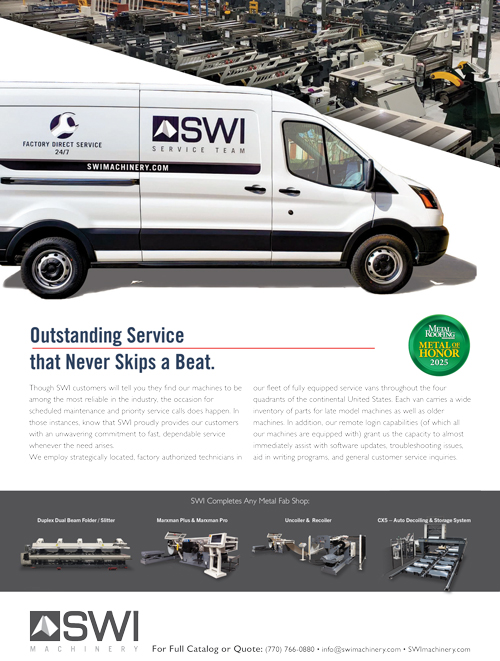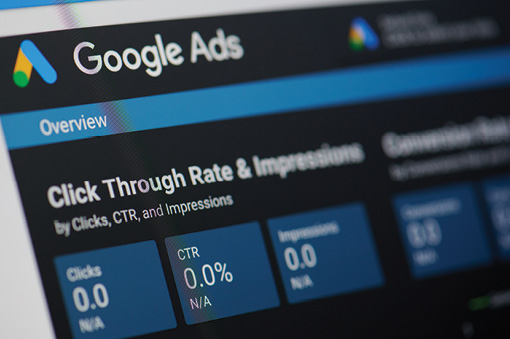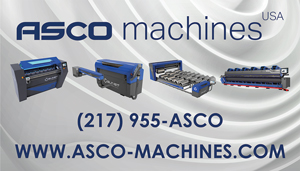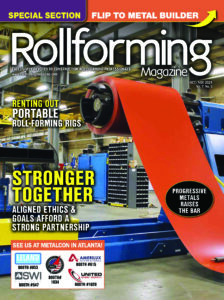Uncle Sam can help or hurt your plans depending on your preparation
■ By Mark E. Battersby
In today’s sluggish economy it is not unusual for an existing roll-formed metal wall and roof business to branch out — or for the owner or self-employed professional to start another business in the same or a different field. Few realize, however, that Uncle Sam, in the form of our tax laws, stands ready to become a partner — although not always a helpful or inexpensive one.
Uncle Sam will not only pick-up part of the expense of branching out or starting up that new venture, but will often allow the losses from a secondary activity to be used to reduce the tax bills generated by income from self-employment, wages, investments — or the primary business.
START-UP COSTS/EXPANDING
BUSINESS WRITE-OFFS
In most cases, the ordinary and necessary expenses of carrying on a trade or business are tax deductible. Of course, if there is no business there, can be no tax deductions for business expenses. Don’t despair because special rules exist for the expenses incurred when starting a business.
Anyone who pays or incurs business start-up costs, and who subsequently enters the trade or business can choose to expense and immediately write-off up to $5,000 of those costs. However, the $5,000 deductible amount is reduced, dollar-for-dollar, when the start-up expenses exceed $50,000.
The so-called “organizational” costs of business entities are a separate class of expense from start-up expenses, although subject to similar rules. An incorporated roll-forming business can, for instance, choose to deduct up to $5,000 of any “organizational” expenses incurred in the tax year business begins.
The balance of start-up or organizational expenses, if any, are amortized (written-off) over a period of not less than 180 months, starting with the month in which the business begins.
BRANCHING OUT
It is quite common for business owners or self-employed contractors and roll-forming professionals to have multiple business activities. Common to almost every situation is the question of whether the new activity is merely a branch or subsidiary of the existing roll-forming business, or will the IRS view it as a separate activity?
If it can be argued that the new operation is really an extension of the original business, a significant write-off is available. To illustrate, suppose John Doe operates a general contracting business. The operation is profitable and he decides to build a shop at the same location that specializes in custom trim and shutters. John Doe’s start-up expenses amount to $70,000 and include the cost of hiring skilled help, setting up bookkeeping, an operation manual, as well as advertising and promoting the operation.
If this were an integrated operation, John Doe’s primary business could immediately deduct the start-up costs. If not, the rules require they be capitalized and amortized.
LOSSES (HOBBY/BUSINESS)
Not so surprisingly, all income from any activity is usually taxable. Fortunately, the losses from a money-losing activity — existing or start-up — can be used to offset the income from other sources. Of course, with an activity not engaged in for profit, that is a hobby, the expenses are generally deductible only to the extent of the activity’s income.
Some expenses are tax deductible whether or not they are incurred in connection with a hobby even after the 2017 Tax Cuts and Jobs Act (TCJA) eliminated many personal itemized deductions. The general rule is an activity is presumed not to be a hobby if profits (more income than expenses) result in any three of five consecutive tax years.
Fortunately, without profitable years anyone operating an activity can, if asked, prove there is “intent” to show a profit using the IRS’s guidelines. If the activity is engaged in for profit, (not if it made a profit, but rather that it is operated with the “intent” of making a profit), many activity-related expenses are legitimately deductible, even those in excess of the activity’s income. The amount by which the activity’s expenses exceed its income, its losses, can offset all income from other sources.
TAX WRITE-OFFS
Not too surprisingly, many roll forming business owners are considering or using many of the TCJA’s tax breaks to start or grow their business. Beware, however, the TCJA’s tax breaks can both help and hinder those expansion plans, while many of the potential pitfalls in our basic tax rules continue lurking ready to cripple the unwary.
On one hand, there is the 100 percent write-off for the cost of equipment and other business assets. But there must be taxable income that can be reduced by that write-off. Plus, to make those purchases, money must be borrowed or the equipment leased. Larger businesses attempting to borrow expansion funding are now limited to an interest expense deduction that cannot exceed 30 percent of the operation’s income.
Leasing, long a staple of cash-starved businesses and startups, faces new accounting rules that require most leases to be reported on the operation’s financial statements. Publicly-traded businesses must already treat leases as a liability, while smaller businesses begin reporting in 2020. And, don’t forget that the tax deduction for start-up expenses is remains limited.
BUSINESS ENTITIES FOR FUN AND PROTECTION
Whether starting a new venture or expanding an existing one, it may be wise to formalize the operation by incorporating or forming a limited liability company (LLC) to provide personal liability protection and give the new operation an edge when it comes to sales, financing and, of course, taxes. And no, the Limited Liability Company (LLC) or incorporated start-up or branching-out enterprise won’t escape IRS scrutiny under the hobby rules.
Corporations (both S and regular C corporations), LLCs, and limited partnerships do offer protection to owners for the operation’s debts. But the corporate veil can be pierced if the creditor can show that the entity was the alter ego of the owners. Sometimes it is enough that the owners are majority shareholders, exercise substantial control over the incorporated operation, or regularly use corporate funds to finance personal expenses.
THE RIGHT FUNDING
Good times or bad, the most difficult question to answer is often what kind of funding should a start-up or an expanding roll-forming business seek? Any quest for business funding begins with an understanding of the various types of financing, where that funding may be found, and at what cost. Or, put another way, what type of funding can best help the new or expanding business?
Generally, there are two basic ways to fund the business: debt financing or equity financing. With equity financing, capital is received in exchange for part ownership in the business. With debt financing capital is received in the form of a loan which must be paid back.
Putting money into the business, or taking money from the business, is not something to be tackled by amateurs. Quite simply, money invested in the business can be withdrawn — with a tax bill on any profits from the sale of that capital investment. On the other hand, a loan made by a contractor to his or her business can be repaid tax-free — if the ever-vigilant IRS accepts it as a bona fide, arm’s length transaction.
THE PASSIVE TRAP
So-called “material participation” rules limit the deduction of losses from so-called “passive activities,” activities where the taxpayer does not “materially participate” in the activity. Losses from passive activities may not be deducted from non-passive income (for example, wages, interest, or dividends).
Generally, an individual materially participates in an activity if, based on all of the facts and circumstances, he or she participates in the activity on a regular, continuous, and substantial basis during the year (the facts and circumstance test), or the individual participates in the activity for more than 500 hours during the year (the 500-hour test).
HELPFUL HELP
Having access to legal, accounting, and other expertise is extremely important when creating or expanding a business, as well as helping the business survive and to grow as rapidly or efficiently as possible. In addition to legal advice, accounting advice for setting up the operation’s books, auditing, payroll services, taxes, and retirement planning might benefit the roll-forming operation.
Remember, however, the first step to finding the right professional requires an inventory of what you and your business or start-up actually need in the way of services and advice, and most importantly, how much you can afford to pay for that advice or service. It is also important to determine beforehand just how much of the work you and your business will do and how much of it will be done by the professional — or professionals.
The IRS can both tax and help underwrite the expansion costs of a roll-forming business or the start-up expenses of a new activity. On the one hand, they stand ready to tax all income. If the activity is an expansion of an on-going business or a start-up venture operated as a “business,” the amount by which the activity’s expenses exceed its income, its “losses,” can be used to offset income from other sources. Will the IRS view your new or expanding roll-forming activity as a tax business? RF
Mark Battersby has more than 35 years’ experience in small business issues, tax and financial matters. Contact him at 610-789-2480 or [email protected].



















